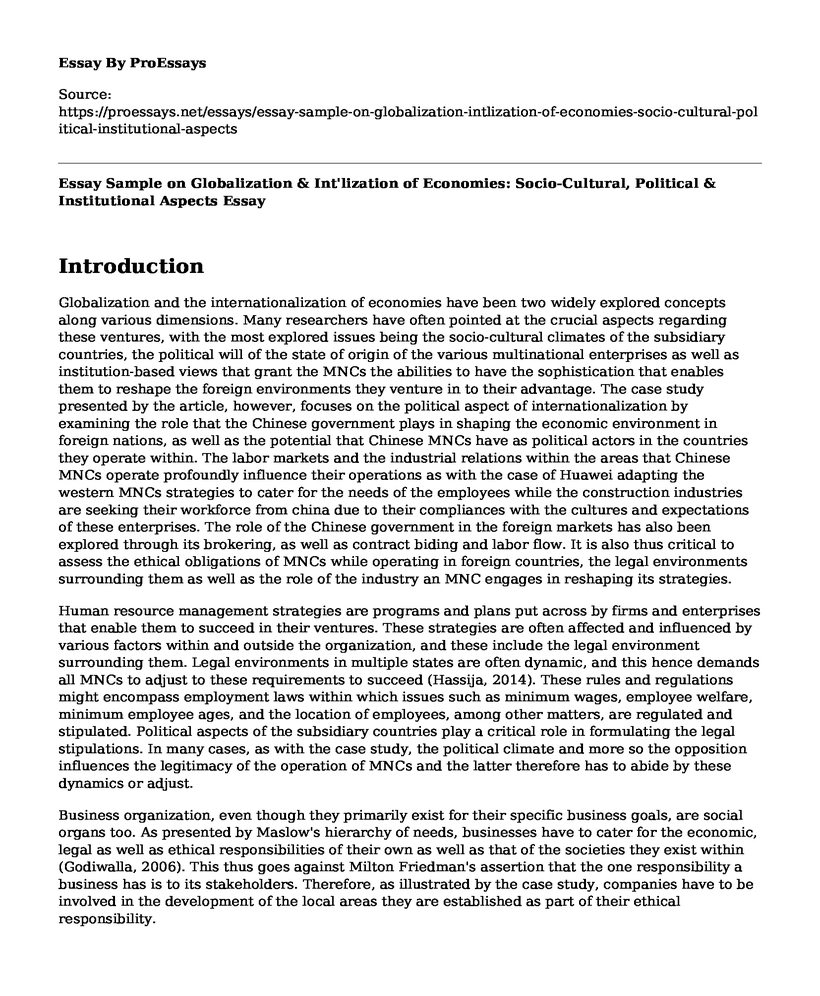Introduction
Globalization and the internationalization of economies have been two widely explored concepts along various dimensions. Many researchers have often pointed at the crucial aspects regarding these ventures, with the most explored issues being the socio-cultural climates of the subsidiary countries, the political will of the state of origin of the various multinational enterprises as well as institution-based views that grant the MNCs the abilities to have the sophistication that enables them to reshape the foreign environments they venture in to their advantage. The case study presented by the article, however, focuses on the political aspect of internationalization by examining the role that the Chinese government plays in shaping the economic environment in foreign nations, as well as the potential that Chinese MNCs have as political actors in the countries they operate within. The labor markets and the industrial relations within the areas that Chinese MNCs operate profoundly influence their operations as with the case of Huawei adapting the western MNCs strategies to cater for the needs of the employees while the construction industries are seeking their workforce from china due to their compliances with the cultures and expectations of these enterprises. The role of the Chinese government in the foreign markets has also been explored through its brokering, as well as contract biding and labor flow. It is also thus critical to assess the ethical obligations of MNCs while operating in foreign countries, the legal environments surrounding them as well as the role of the industry an MNC engages in reshaping its strategies.
Human resource management strategies are programs and plans put across by firms and enterprises that enable them to succeed in their ventures. These strategies are often affected and influenced by various factors within and outside the organization, and these include the legal environment surrounding them. Legal environments in multiple states are often dynamic, and this hence demands all MNCs to adjust to these requirements to succeed (Hassija, 2014). These rules and regulations might encompass employment laws within which issues such as minimum wages, employee welfare, minimum employee ages, and the location of employees, among other matters, are regulated and stipulated. Political aspects of the subsidiary countries play a critical role in formulating the legal stipulations. In many cases, as with the case study, the political climate and more so the opposition influences the legitimacy of the operation of MNCs and the latter therefore has to abide by these dynamics or adjust.
Business organization, even though they primarily exist for their specific business goals, are social organs too. As presented by Maslow's hierarchy of needs, businesses have to cater for the economic, legal as well as ethical responsibilities of their own as well as that of the societies they exist within (Godiwalla, 2006). This thus goes against Milton Friedman's assertion that the one responsibility a business has is to its stakeholders. Therefore, as illustrated by the case study, companies have to be involved in the development of the local areas they are established as part of their ethical responsibility.
HRMs often change depending on the industry they operate in. As illustrated from the case study, Huawei had to adjust to the strategies of western MNCs in terms of their labor strategies to attract and sustain the employees they acquired from the local regions they were established (Lee, 2014). For construction companies, however, they targeted the lowly qualified employees and at ties sought labor force from their countries of origin since they understood better the organizational culture.
Businesses have to develop effective HRM strategies for them to succeed. These strategies have to cater to the different factors that dictate the operations of the organization. Globalization has further evolved this as the political, legal, economic, social, and cultural aspects of the subsidiary countries have to be considered more so for MNCs. The legal obligations of the MNCs, therefore, must be allied with that of the subsidiary countries. There also exist ethical obligations that go beyond the stipulated ones, and these encompass the requirement for these MNCs to help the areas they operate within.
References
Godiwalla Y. (2006). The MNCs Global Ethics and Social Responsibility: A Strategic Diversity Management Imperative. Journal of Diversity Management. 1(2). Pp. 43-50. DOI: 10.19030/jdm.v1i2.5034
Hassija T. (2014). Strategic human resource management in changing environment. International Journal of Reviews, Surveys and Research (IJRSR). 3(2). Pp. 86-99. https://pdfs.semanticscholar.org/efa0/31a7f8e1f77185c662c39d99c9418ae694f1.pdf
Lee C. F. (2014). Chinese Multinational Firms in Asia and Africa: Relationships with Institutional Actors and Patterns of HRM Practices. Human resource management. 53(6). Pp. 1-25.
Cite this page
Essay Sample on Globalization & Int'lization of Economies: Socio-Cultural, Political & Institutional Aspects. (2023, Jan 30). Retrieved from https://proessays.net/essays/essay-sample-on-globalization-intlization-of-economies-socio-cultural-political-institutional-aspects
If you are the original author of this essay and no longer wish to have it published on the ProEssays website, please click below to request its removal:
- Effect of Globalization on the U.S. Labor Market Essay
- Essay Example on Employment Laws: Key Rules and Conflict Resolution
- Pay-for-Performance: Incentivizing Employee Productivity for Business Growth - Essay Sample
- Essay Example on Healthy Competition: Benefits, Types, & Customer Relationships
- Research Paper Example on Greece's Decade of Crisis: Economic Collapse and Recovery
- Performance Evaluation: Crucial Process for Organizational Success - Paper Sample
- Free Essay on Globalization's Impact on Peasant Farmers: Economic and Social Disparities







